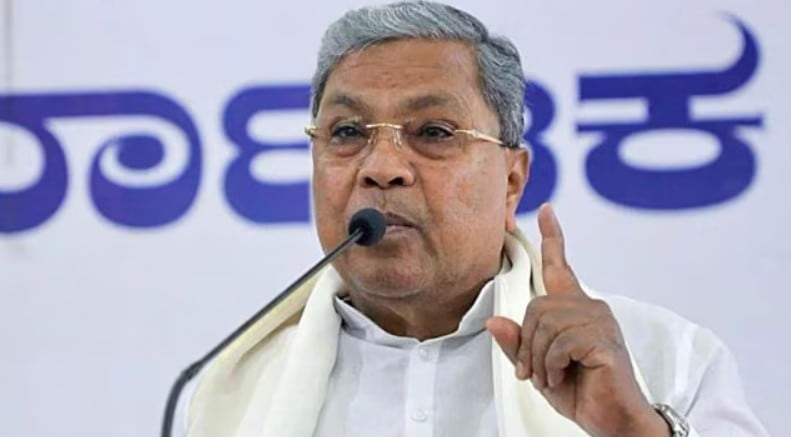Taking a leaf out of Maharashtra and Tamil Nadu’s book, the Congress government in Karnataka has thrown its hat into the ring by resisting the three-language policy proposed in the National Education Policy (NEP), 2020. While the government is viewing the three-language policy as a way to ‘impose Hindi’ on the state, its move towards a two-language curriculum has also stirred unease.
Currently, Karnataka follows a three-language policy in state board-affiliated schools, allowing students to choose either Hindi, Sanskrit or any other Indian language as the third language from Class 6. Meanwhile, the first and second languages remain Kannada and English, respectively.
However, in Urdu-, Marathi-, Telugu- and Tamil-medium schools, the first language would be the respective language of the medium of instruction. While the second language choice is mostly English, the third language is either Hindi or Kannada.
In a post on X on June 29, the Karnataka Congress had stated that mandating Hindi as a third language in schools would create discord and pose learning difficulties for Kannada, Tulu and Kodava speakers. “South India’s linguistic diversity is a vibrant tapestry, weaving together languages like Kannada, Kodava, Tulu, Konkani, Tamil, Telugu, Malayalam, and many others. However, mandating Hindi as a third language in schools, especially in non-Hindi-speaking states like Karnataka, creates discord. For speakers of Kannada, Tulu, or Kodava who are fluent in Kannada and English, struggling with written Hindi is a significant challenge—a sentiment shared by many students in linguistically rich regions,” the post read. It also further stated that forcing Hindi can hinder students who excel in other areas.
Speaking to reporters in Mysuru earlier this month, Chief Minister Siddaramaiah backed a two-language policy and emphasised that his government was committed to it.
The push for a two-language policy has been backed by education expert Niranjanaradhya VP, who is also a key member of the government’s State Education Policy (SEP) commission, headed by former UGC chairman Sukhadeo Thorat. “Introducing a third language causes an additional burden on the child, which will hamper their cognitive skills. Like Tamil Nadu, Karnataka should also stick to two languages in state board schools, with one regional language, Kannada, and the other one being English. Studies have proved that language proficiency is higher among adults than children. Hence, introducing additional languages early on will hinder their cognitive skills,” he noted.
Sources in the government said that the school education department has yet to consider a policy shift in language. Moreover, the SEP commission has yet to submit a report on the two-language policy.
However, this idea has not been well received among private school management associations, education experts, pro-Kannada groups, and other stakeholders.
On July 13, Basavaraj Horatti, Chairman of the Karnataka Legislative Council, wrote to Siddaramaiah, urging him to continue with the three-language formula to foster multilingualism and national integration as envisaged in the Kothari Education Commission (1964-1966). “The three-language formula equips students with the ability to communicate effectively in different languages, allowing them to pursue higher education and careers across various states. Psychological studies suggest that learning multiple languages enhances cognitive development,” he said.
He added, “It is noteworthy that over 17,909 students in the state scored a perfect 100 in Hindi in the SSLC examinations—more than in any other subject. While some argue that students fail more frequently in Hindi, statistics show that more students pass in Hindi than in many other subjects. In fact, strong performance in Hindi often contributes to improving the overall academic results.” Horatti also raised concerns over the livelihood of 15,000 Hindi teachers and their families in the state if the government decided to drop the three-language formula.
On July 12, D Shashikumar, General Secretary, Associated Managements of Primary and Secondary Schools in Karnataka (KAMS), warned of legal action if the state government decides to drop the existing three-language policy in state board-affiliated schools.
In a representation to Siddaramaiah, the association appealed not to disturb the existing three-language policy, and instead implement key reforms to the language assessment system in the interest of the students.
“The Karnataka government is indulging in knee-jerk reactions following the developments in Maharashtra. We are, of course, against the imposition of Hindi. However, we believe a third language with the option of learning Hindi or Sanskrit or any other Indian language will enhance the cognitive skills of the students,” Shashikumar said. He added that limiting language choice violates parents’ and students’ fundamental rights as per various landmark Supreme Court judgments.
“Switching to a two-language policy will hamper the livelihood of 4,000 Urdu-medium schools and their teachers. What will happen to them? What will be the plight of linguistic minorities in the state who speak Tamil, Tulu, Telugu, and Marathi? They will be devoid of linguistic choices,” said Shashikumar. He also appealed to the state government to bring the first language marks in SSLC down to 100 from 125, to ensure parity with other boards.

